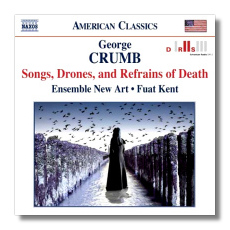
The Internet's Premier Classical Music Source
Related Links
- Crumb Reviews
- Latest Reviews
- More Reviews
-
By Composer
-
Collections
DVD & Blu-ray
Books
Concert Reviews
Articles/Interviews
Software
Audio
Search Amazon
Recommended Links
Site News
 CD Review
CD Review
George Crumb

- Songs, Drones, and Refrains of Death (1962-68)
- Quest (1994)
Nicholas Isherwood, baritone
Ensemble New Art/Fuat Kent
Naxos 8.559290 54:45
Born in 1929, George Crumb is still going strong. Throughout much of his career as a composer, he has been influenced by the poetry of Federico García Lorca, and it is four of the Spanish poet's texts that have been set in Songs, Drones, and Refrains of Death. This work occupied Crumb for some six years, between 1962 and 1968. Admirers of Crumb's music will recognize the use of unusual performance techniques for both the baritone soloist and the instrumental ensemble that accompanies him. The two percussionists play an array of instruments (including jew's harps), amplified instruments are used, and the instrumentalists also are asked to make vocal contributions to the performance. As for the baritone, in between what usually passes for singing, he whispers, shouts, hums, and, in "Song of the Rider, 1860," whinnies like a horse. Crumb's music doesn't sound like anyone else's, and his response to the texts is particularly personal. This is not relaxing music, but Crumb is as successful as any composer has been in capturing the feverish quality of Lorca's poetry.
Quest, completed in 1994, was composed for guitarist David Starobin, who had played in many of Crumb's earlier works. At first, Quest was to have been a work for solo acoustic guitar, but the composer's lack of experience in writing for the guitar by itself led him to write a chamber work instead, in which "the guitar remains the protagonist, but other instruments… can also take over the principal 'voice'." As he sketched this work, Crumb was moved to consider the significance of journeys of various sorts. Again, Lorca came to mind, as did Dante's Inferno. Twice in the work, the soprano saxophone quotes the hymn Amazing Grace, thereby suggesting yet another type of spiritual journey. As with Songs, Drones, and Refrains of Death, it also took Crumb several years to bring Quest to its final form. It is less tightly composed than the earlier work, and less immediately approachable, but again, it is typical of the composer, particularly in its rich instrumental palette.
Starobin has recorded both of these works for Bridge Records – Songs, Drones, and Refrains of Death on Bridge 9028 and Quest on Bridge 9069 – and if you have those recordings, there's probably no need to replace them with this new Naxos disc. In the former work, Bridge's baritone is Sanford Sylvan, and his performance feels less self-conscious than Nicholas Isherwood's here. Bridge's ensemble also revels more in Crumb's idiosyncrasies, whereas Fuat Kent and the Ensemble New Art (an Austrian new music ensemble founded in 1991) smooths them out more. Nothing is wrong with these performances though – the only thing they really lack is the "you are there" authenticity provided by Starobin, Sylvan, and Speculum Musicae. Naxos doesn't provide texts for the earlier work, but they can be downloaded online. The recording, made in the studios of Swiss Radio DRS, is fine… but again, Bridge's is more immediate.
Copyright © 2006, Raymond Tuttle




















